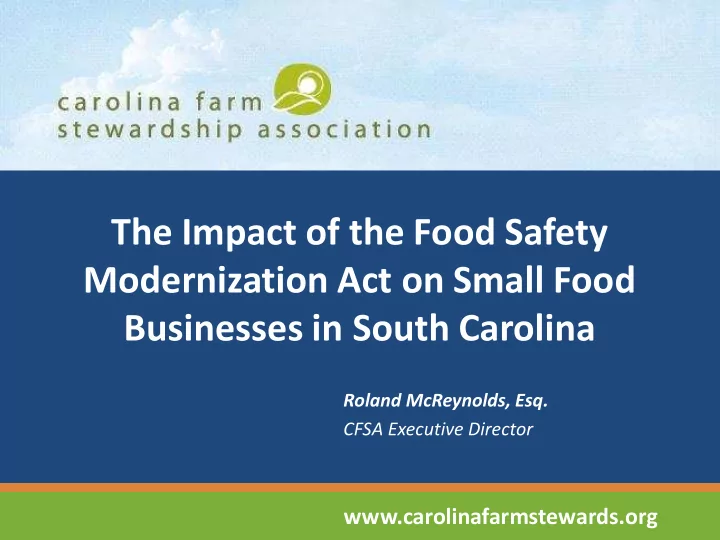

The Impact of the Food Safety Modernization Act on Small Food Businesses in South Carolina Roland McReynolds, Esq. CFSA Executive Director www.carolinafarmstewards.org
CFSA is a farmer-driven, membership-based non-profit that supports farming that is good for consumers, good for our farmers and farmworkers, and good for the land.
CFSA’s Food Safety Work • Heavily engaged in FSMA legislative process • Active in developing comments on FSMA proposed rules on behalf of sustainable ag • Provide food safety training tailored to diversified and organic farms • GAP training videos for diversified farms on YouTube www.carolinafarmstewards.org
About the Food Safety Modernization Act • Became law in Jan. 2011 • Draft regulations issued by FDA in Jan. 2013; certain portions of drafts revised and re-issued Sept. 2014 • Final regulations to be issued Aug. 2015 • Requires food processing/manufacturing facilities to adopt HACCP-like systems, known as HARPC (Hazard Analysis and Risk-Based Preventive Controls) www.carolinafarmstewards.org
What is a Food Processing/Manufacturing Facility? Processing/manufacturing defined as “making food from one or more ingredients, or synthesizing, preparing, treating, modifying or manipulating food, including food crops or ingredients. Examples of manufacturing/processing activities are cutting, peeling, trimming, washing, waxing, eviscerating, rendering, cooking, baking, freezing, cooling, pasteurizing, homogenizing, mixing, formulating, bottling, milling, grinding, extracting juice, distilling, labeling, or packaging.” 21 CFR 1.227(b)(6) www.carolinafarmstewards.org
Examples of Covered Facilities • Cheese makers • Grain mills • Most produce distributors • Wholesale bakeries • Coffee roasters • Candy manufacturers • Soft-drink makers • Jam and jelly makers • Producers of pickles and fermented foods • BBQ and other sauces www.carolinafarmstewards.org
Entities that Are NOT Covered • Facilities that make the majority of their sales direct to consumers, including restaurants, grocery stores, retail bakeries. • Non-profit food establishments • Private homes • Fishing vessels • Farms, unless then conduct certain processing activities • Establishments already subject to Seafood HACCP, juice HACCP, and FDA’s regulations for Thermally Processed Low-Acid Foods Packaged in Hermetically Sealed Containers • Alcoholic beverage manufacturers • Meat processing facilities regulated by USDA or SC Meat & Poultry Inspection Division • Establishments that solely hold packaged food that is not exposed to the environment • Establishments that only store raw agricultural commodities other than fruits and vegetables www.carolinafarmstewards.org
HARPC Requirement • HARPC must include • written food safety plan • hazard analysis • food safety plan monitoring • corrective actions • validation of plan • periodic reanalysis and revision of plan • documentation www.carolinafarmstewards.org
HARPC Requirement • Compliance officer: Facilities must have an individual, trained to standards set by FDA, to oversee all aspects of the HARPC program • Supplier Verification: Facilities required to ensure that their suppliers are in compliance with FDA rules • Environmental and Product Testing: Facilities are required to include testing in their validation program www.carolinafarmstewards.org
The Cost of HARPC • In 2013 FDA estimated the annual cost of compliance with the HARPC requirement at $13,000/year • 73% of the aggregate costs would fall on businesses with 20 or fewer employees • In 2014, FDA added estimates for the cost of: • Supplier Verification: $3,350/year for businesses w/fewer than 20 employees • Environmental Testing: $2,891/year for businesses w/fewer than 20 employees • Product Testing: $12,000/year for businesses w/fewer than 20 employees www.carolinafarmstewards.org
The Cost of HARPC “[FDA] concludes that the proposed rule will have a significant economic impact on a substantial number of small entities… The regulatory costs of this proposed rule may discourage at least some new small businesses from entering the industry .” Very small businesses would face $31,000 in HARPC costs annually www.carolinafarmstewards.org
Compliance Timelines • Large businesses (>500 employees) will have 1 year to come into compliance • Small businesses (<500 employees) will have 2 years • Very Small businesses (<$1 million in annual sales of human food; $2 million for animal food facilities) can qualify for protection from HARPC requirements if state law allows for alternative oversight www.carolinafarmstewards.org
SC Set to Adopt FDA’s Requirements in Full • FDA proposing HARPC as amendment to existing Current Good Manufacturing Practices (CGMP) regulations • SC adopts CGMPs by reference, and so will automatically impose HARPC on all food facilities, including qualified Very Small business, unless the legislature takes action to establish a ‘safe harbor’ www.carolinafarmstewards.org
Tester-Hagan Amendment Very small business can be exempted from HARPC requirement if it can provide: “[D] ocumentation (which may include licenses, inspection reports, certificates, permits, credentials, certification by an appropriate agency (such as a State department of agriculture), or other evidence of oversight), as specified by the Secretary, that the facility is in compliance with State, local, county, or other applicable … food safety law” www.carolinafarmstewards.org
Taking Advantage of Tester-Hagan Amendment S.284 would allow SC to continue to regulate safety practices at qualified Very Small food processing facilities, without imposing the additional $31,000 in annual costs that the HARPC requirement will otherwise create for those Very Small businesses www.carolinafarmstewards.org
Questions? Roland McReynolds, Esq. Executive Director roland@carolinafarmstewards.org 919.542.2402 www.carolinafarmstewards.org
Recommend
More recommend